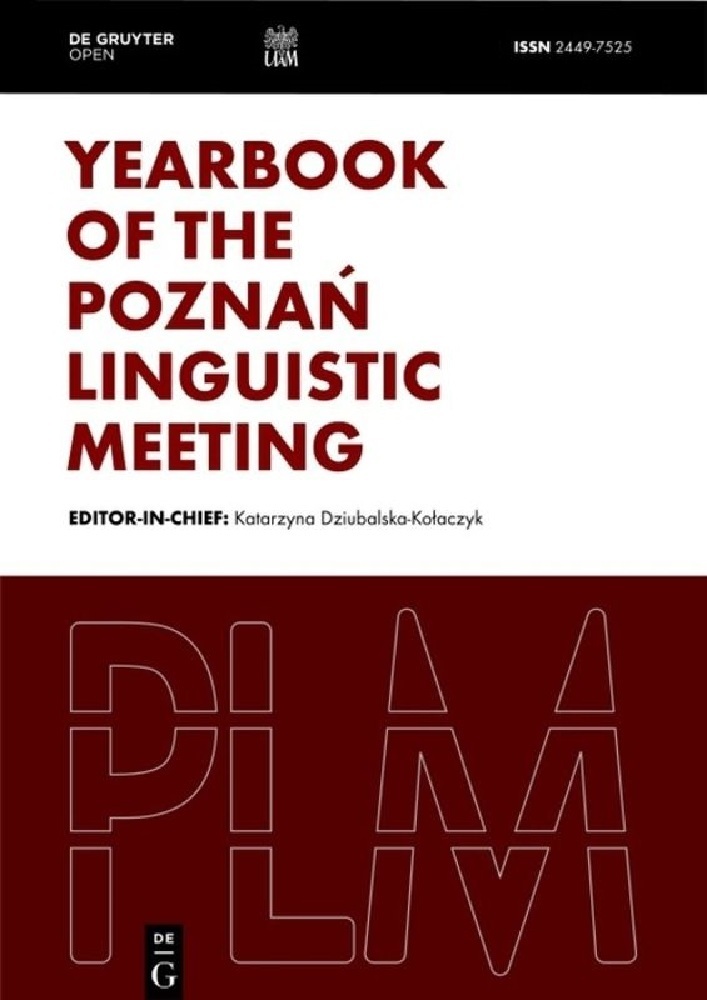Abstract
This paper is primarily concerned with the role of partial acceptability (and its ‘flavors’) in English linguistic examples taken from the field of generative grammar. Partially acceptable judgments as a subset of acceptability judgments form a heterogeneous group that plays a significant role in linguistic research and yet the extent to which partial acceptability is employed in the linguistic literature has not been studied extensively. The first part of the paper discusses a number of relevant issues related to the use of partial acceptability, such as problems with the conceptualization of gradience or excessive creativity with regard to levels of acceptability present in generative papers. The second part of the paper reports on a meta-linguistic study of partial acceptability in a pre-selected corpus of generative papers on English, with the focus on the types of partial acceptability and their function. Lastly, the English results are compared with the results of a previously conducted similar study of partial acceptability in Polish.
References
Cowart, Wayne. 1997. Experimental syntax: Applying objective methods to sentence judgments. Thousands Oaks, CA: Sage.
Culicover, Peter W. & Ray Jackendoff. 2010. Quantitative methods alone are not enough: Response to Gibson and Fedorenko. Trends in Cognitive Sciences 14(6). 234–235.
Dąbrowska, Ewa. 2010. Naive vs. expert intuitions: An empirical study of accepta-bility judgments. The Linguistic Review 27. 1–23.
Gibson, Edward & Evelina Fedorenko. 2010. Weak quantitative standards in lin-guistic research. Trends in Cognitive Sciences 14(6). 233–234.
Phillips, Colin. 2009. Should we impeach armchair linguists? Japanese/Korean Lin-guistics 17. 49–64.
Schütze, Carson T. 1996. The empirical base of linguistics: Grammaticality judg-ments and linguistic methodology. Chicago: University of Chicago Press.
Schütze, Carson T. 2020. Acceptability ratings cannot be taken at face value. In Samuel Schindler, Anna Drożdżowicz, & Karen Brøcker (eds.), Linguistic intui-tions: Evidence and method, 189–214. Oxford: OUP.
Sprouse, Jon & Diogo Almeida. 2012. Assessing the reliability of textbook data in syntax: Adger’s Core Syntax. Journal of Linguistics 48(3). 609–652.
Sprouse, Jon & Diogo Almeida. 2017. Design sensitivity and statistical power in acceptability judgment experiments. Glossa: A Journal of General Linguistics 2(1). 1–32.
Sprouse, Jon, Carson T. Schütze & Diogo Almeida. 2013. A comparison of informal and formal acceptability judgments using a random sample from Linguistic In-quiry 2001–2010. Lingua 134. 219–248.
Wasow, Thomas & Jennifer Arnold. 2005. Intuitions in linguistic argumentation. Lingua 115. 1481–1496.
Żychliński, Sylwiusz. 2020. The role of reduced acceptability in Polish linguistic articles. In Karolina Drabikowska & Anna Prażmowska (eds.), 197–210. Explor-ing variation in linguistic patterns. Lublin: Wydawnictwo KUL.
License
All papers published by the Yearbook of the Poznań Linguistic Meeting are published in an Open Access model using the CC-BY-NC-ND 4.0 Creative Commons licence.

